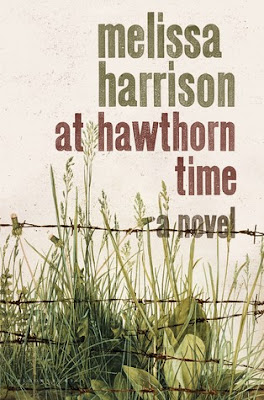At Hawthorn Time is also about change, in particular the way that the agricultural economy is changing. Change is, of course, inevitable and one of the dangers about writing about the countryside is there can be a tendency to suggest that change is recent, and the countryside was exactly the same until very recently. Yet what the book is really about is how the British countryside and its agriculture has been destroyed by external forces, leaving its population high and dry.
At times it reminded me of Alun Howkins' book The Death of Rural England which details how the late 20th and 21st centuries have seen the rural economy squeezed by the overlapping interests of capital and British towns and cities. Harrison's novel is linked together by the story of Jack, a former environmental campaigner who has protested nuclear weapons and road building, but now finds himself tramping along the forgotten (and sometimes vanished) paths and highways of the countryside. Frequently arrested for trespassing he is often dismissed as "mad" or a criminal, yet he is the last of a breed of rural workers whose labour held together the seasonal harvests, ploughing and planting. Without those like him, who knew the land and walked from place to place, agriculture would not have survived. He has been replaced by cheap labour from Eastern Europe, ironically something else about to vanish from the countryside. Jack is very much the essence of the working countryside - but also those part of the countryside that strove to protect and defend it from simply being tied into the profit machine.
Jack's walking brings him to Lodeshill, a place where he has worked over many years, and knows some of its darker history. Lodeshill is where Howard and Kitty live, retirement refugees from the city. Kitty fulfilling a lives ambition, and Howard dragged there against his better judgement. For both of them the countryside forms a backdrop to the final collapse of their marriage, and for both of them its a refuge of sorts - Kitty through her art and Howard through is cynical abstention from village life. The two of them also represent the change coming to Lodeshill as the older economy vanishes. Second homes, the price of land and high rents combine to squeeze out older communities and local labour all but vanishes as young people look to the bright urban life.
The best rural novels are those that reject a bucolic fantasy and place their story in the context of the real countryside. Unemployment, poverty, hard work and class struggle are not alien to the countryside, but just as in towns and cities, they are part of everyday life. What Harrison's novel does however is to make these realities the story itself, the strands of the book drawing different aspects of this reality together through the stories of individual characters.
In Stella Gibbons' dark comedy Cold Comfort Farm she hints at the darkness below the surface of the countryside with her brief mention of "something nasty in the woodshed". Harrison's novel is very different. It wears the darkness openly - we know the unpleasant way the book will end from the first page. But the real darkness addressed by At Hawthorn Time is less what happens to Jack and all the other inhabitants of Lodeshill as individuals. They are all victims of faceless economic change, which they are powerless to resist. The darkness comes from that uncertainty and from what is lost.
When Jack encounters the elderly James, a former ploughman who is now suffering from dementia and has wandered away from home, he reflects on the old man's life, a "unique landscape of memories, parts of it sunlit and open, parts shadowy and unvisited, all of which would soon be... lost". The countryside has always changed, communities, agricultural practices, buildings and crops are never permanent. What Melissa Harrison's wonderful novel does is to remind us of how much has been destroyed and what happens to those who are left behind.
Related Reviews
Harrison - All Among the Barley
Chester - On Gallows Down
Gibbons - Cold Comfort Farm

No comments:
Post a Comment